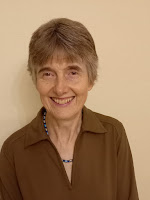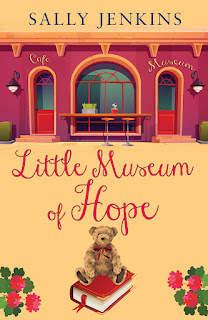Guest Post With Sally Jenkins
Today I'm very pleased to welcome fellow Joffe Books /Ruby Fiction author, Sally Jenkins, to the blog. Her debut novel, Little Museum of Hope, is due to be published tomorrow, Tuesday 25th April.
Sally, welcome. I'm really looking forward to what you have to tell us about your new novel. It's over to you.
Little Museum of Hope
When I give talks about my writing or mention it to
friends and family, one question pops up again and again: Is it autobiographical - did this happen to you? My
answer has always been an emphatic No, and I believed that to be true.
However, on reflection, I’ve been lying.
· Within the museum is the Mended Heart Café, also run
by Vanessa, even though she is a disaster at baking - like me! My cookery
teacher wrote on my school report: Sally’s written work is far better than
her practical work. Vanessa received the same diplomatic criticism.
· Maxine is one of the first donors to the museum. She
shares the story of her teenage love affair with the boy next door and its dark
repercussions into her future. I never got as far as the love affair but I did
have a crush on our neighbour’s son and, like Maxine, watched for him out of
the window.
·
Stephen tells Vanessa how he learned to bell ring, in order to cope with grief, and reveals that it created new problems in his life. He donates ‘Diagrams’, a bell-ringing book, to the museum. I have been a church bell ringer since the age of fourteen and I own a copy of that book – albeit without the loving inscription found inside Stephen’s copy. My own experience in bell towers was invaluable to accurately describe Stephen’s first trip up a spiral staircase and into the ringing chamber.· Rose has a very minor role in Little Museum of Hope
but, like me, she discovers the benefit of a Speakers’ Club. Some years ago,
when I began to write seriously, I joined a Speakers’ Club because I knew I
needed to grow my confidence in order to promote myself and my books. It was
one of the best decisions I ever made!
· I’m probably not the only 1960s (and possibly later?)
baby to have had to learn to walk by pushing a cute stuffed dog on a frame. My
Ruby Fiction editor put her hand up to this as well! When Joanne brings her old
family album to the museum it features a picture of her, as a toddler, in the
garden with a dog just like my own.
· I work part-time in IT and, in the past, I’ve
struggled to make my job interesting enough to use in fiction. In Little
Museum of Hope, Karen has an office affair and her employer is an IT company
– finally giving me the opportunity to drop in a few tiny details to add
realism (not about the affair!).
Back to that original question: Is it
autobiographical - did this happen to you?
New answer: None of the things in Little Museum of
Hope happened to me in their entirety but there’s a little bit of me in many
parts of the book. Plus, there may be more than I’m owning up to here!
About Little Museum of Hope
A jar of festival mud, a photo album of family
memories, a child’s teddy bear, a book of bell ringing methods, an old cassette
tape, a pair of slippers …
These are the items that fill the exhibit shelves in
Vanessa Jones’ museum. At first glance, they appear to have nothing in common,
but that’s before you find out the stories behind them …
Because Vanessa’s Little Museum of Hope is no ordinary
museum – its aim is to help people heal by donating items associated with
shattered lives and failed relationships, and in doing so, find a way to move
on, perhaps even start again.
The museum soon becomes a sanctuary for the broken
hearts in Vanessa’s city, and she’s always on hand to offer a cup of tea, a
slice of cake and a listening ear.
But could the bringer of Hope need a little help
moving on herself?
Buying Links
Amazon: https://www.amazon.co.uk/Little-Museum-Hope-Guaranteed-heartstrings-ebook/dp/B0BW4SZXRQ/
About the Author
Sally Jenkins lives in the West Midlands with her
husband. When not writing and not working in IT, she feeds her addiction to
words by working part-time in her local library, running two reading groups and
giving talks about her writing. Sally can also be found walking, church bell
ringing and enjoying shavasana in her yoga class.
Get in touch or follow Sally:
Website/blog: https://sally-jenkins.com/
Facebook: SallyJenkinsAuthor
Twitter: @sallyjenkinsuk
Instagram: @sallyjenkinsuk
Thank you, Sally. That was fascinating. I'm sure readers will now be guessing about which other autobiographical snippets you didn't own up to! I hope the novel does really well and your sales soar.





.PNG)





